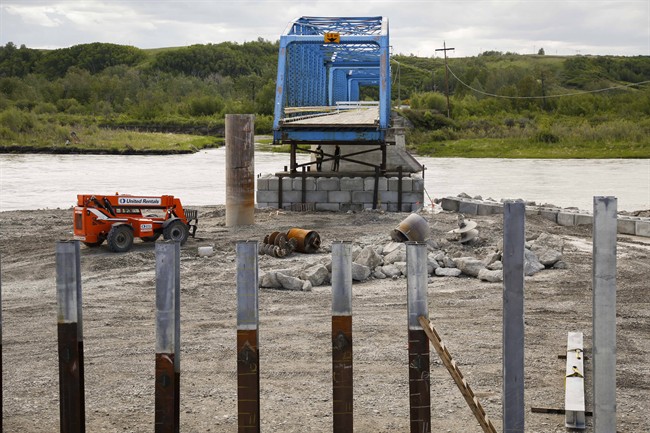SIKSIKA, Alta. – Scotty Owl Child just wants to be back home.

His was one of about 170 houses hit by devastating floods last June on the Siksika reserve, about an hour’s drive east of Calgary.
Owl Child, 31, remembers police coming to his home in the North Camp area as the Bow River spilled its banks.
“We left a bunch of stuff behind,” he says. “I lost a lot of stuff — my bed, my dresser. A bunch of stuff.
“I just really want to get back home and organize the basement and all that again. Hopefully I get back in the house soon.”
A year after the deluge that swamped much of southern Alberta, including a large part of downtown Calgary, life has yet to return to normal on the Siksika reserve, home to 7,000.
Evacuees are still living in construction trailers or in hotel rooms in nearby towns. Dozens of homes have been “black-coded,” meaning the can’t be salvaged and will have to be demolished. “Red-coded” homes — a tier better than black — may also be lost.
A large part of the community remains cut off from the rest, because the crucial Chicago Bridge over the Bow River has been out of commission since the flood.
Siksika’s rebuilding effort is expected to take some major steps in the next few weeks.
A temporary neighbourhood of 64 modular homes provided by the province is nearing completion. Families could begin moving into the two-, three- and four-person units by the end of the month.
The temporary homes could be occupied for up to four years, depending on how quickly permanent dwellings can be rebuilt. The challenge is selecting who gets to move in first, says tribal manager Romeo Crow Chief.
Repairs on the Chicago Bridge are also expected to wrap up by the end of June, a welcome development for residents on the south side of the river who have had to travel up to an hour out of their way for services or to get to their jobs on the north side.
As hard as the rebuild has been, Crow Chief says the less tangible aspects trouble him more.
“I think we have enough work that’s happening in the physical part of the community, the housing, infrastructure. We’ve got that going. But it’s rebuilding the people.”
The situation has been particularly tough on 150 children whose homes were affected, Crow Chief says. The construction trailers are small and not conducive to a calm home life long term.
“They’re eating cafeteria style. They don’t have their own little family gatherings,” he says. “I’m hoping as we move forward we’ll be able to provide a stable home environment for them again.”
Charities such as the Red Cross and Samaritan’s Purse have been a big help, says Reynold Medicine Traveller, who has recently been tasked with co-ordinating the next phase of the recovery effort.
The First Nation is also grateful for the support it’s been receiving from the Alberta government, he says.
The Siksika signed a memorandum of understanding with the province in November which covers rebuilding housing and infrastructure, but also psycho-social help.
“You’re trying to deal with all those emotions — the anger, the resentfulness, dealing with those things,” says Medicine Traveller. “The helplessness, because you can’t do nothing. You can’t do nothing to what just happened to your house.”
Even before the flooding, Siksika was short about 400 homes, Medicine Traveller says. As on many reserves, overcrowding was an issue. The flooding brought the severity of the problem to light.
“There’s a house here that (had) 25 people,” Medicine Traveller says.
Part of the agreement with the province is for Siksika members to find training and employment tied to rebuilding.
Lorelee Waterchief, who works at the Old Sun Community College on the reserve, says she understands the draw those temporary jobs have, but she’s worried about what it will mean for school enrolment.
Already, she’s seen the impact the flood has had on retention numbers at the college.
“I guess it’s pretty hard to get up and go to school when you don’t have a home and you’re just trying to survive.”
No lives were lost on the reserve during the flood, but some elder members succumbed to illness in the subsequent months.
Waterchief says she wouldn’t be surprised if the stress of the ordeal played a role.
She says she expects the healing process to be a long one.
“I really feel that the whole community has been in a state of mass trauma.”
— Follow @LaurenKrugel on Twitter



Comments